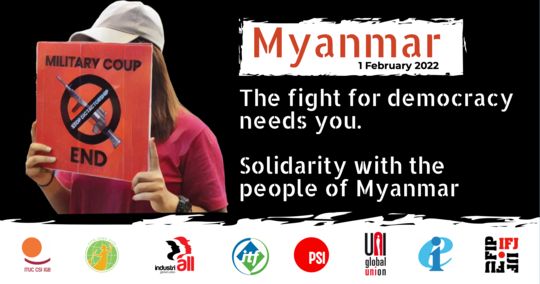According to Reporting ASEAN, at least 120 journalists and media workers have been arrested since the beginning of the military coup, with 46 currently detained as of January 26. 40 of the arrested journalists were charged with violating Section 505(a) of the Penal Code, under which it is a crime to cause, or intend to cause, members of the government to be “disobedient or disloyal”.
In June, Democratic Voice of Burma (DVB) reporter Aung Kyaw, and freelance reporter Ko Zaw Zaw, were the first journalists to be sentenced to two years jail under the amended Section 505(a).
On December 25, editor for the Federal News Journal, Sai Win Aung, was killed in an artillery attack by Myanmar’s armed forces, the Tatmadaw, while reporting on refugees in southeastern Kayin state’s Myawaddy township near the Thai border.
On January 9, the body of journalist Pu Tuidim, a founder of media collective Burma News International (BNI), was found, along with nine others, in Chin State. The citizens were thought to have been captured and used as human shields by the military’s 140 Infantry Battalion, however, it is unclear if Tuidim was targeted for his work as a journalist.
The junta also continues to intensify its restrictions on internet use, seeking to adopt a new cybersecurity law that would ban the use of virtual private networks (VPNs) to access banned sites, such as Facebook. The draft law would grant the regime the power to ban content, access and intercept user data and restrict internet providers.
Restricting access to internet platforms, including prohibiting VPN usage, contravenes the United Nations’ (UN) resolution on ‘freedom of opinion and expression’, which recognises that these freedoms are human rights guaranteed to all, both online and offline.
According to the United Nations Development Program (UNDP), around 26 million people, or 48.2 per cent of Myanmar’s population, could be living in poverty by 2022, compared with 24.8 per cent in 2017. Many journalists have been forced to find other work to survive, as media closures, satellite blackouts, confiscation of mobile phones, beatings and arrests, have driven many in the profession into hiding.
Silent strikes have taken place across the nation, as pro-democracy protestors display their resistance against the military government.
On February 1, 2022, the IFJ joined with several other global union federations, including the International Trade Union Confederation (ITUC) and IndustriALL, to stand in solidarity with the people of Myanmar one year on from the military coup.
The IFJ said: “Journalists and media workers have suffered intensely throughout the first year of Myanmar’s military coup, actively hunted and silenced for doing their jobs. The shutdown of independent media, internet restrictions and stringent censorship mean press freedom is non-existent under the junta. The IFJ calls for increased international support to aid and protect journalists and media workers living under the coup.”

